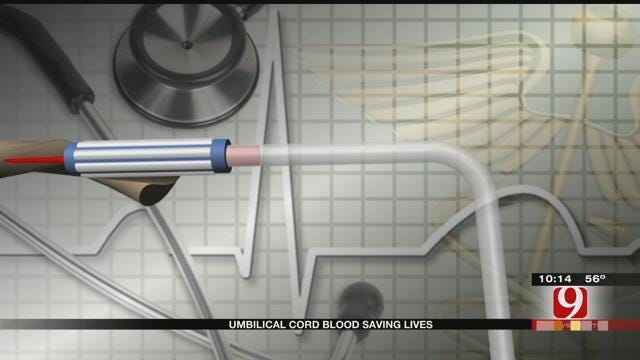First Public Cord Blood Center Planned For Oklahoma
<p>An umbilical cord is a life line between a mother and her unborn child. </p>Thursday, March 10th 2016, 11:07 pm
An umbilical cord is a life line between a mother and her unborn child. Considered medical waste, that cord is simply tossed out after the baby is born. However, researchers have found what is being thrown in the garbage right now can be a lifesaver for others in the future.
"At 27, I never thought I'd live to see 40," remembers Howie Jackson.
In 2001, less than a year after he got married, doctors diagnosed Jackson with acute lymphoblast leukemia.
"The way my leukemia progressed, I needed a bone marrow transplant and being adopted from Portugal made the search for a donor a little more difficult," Jackson said.
Knowing he needed a transplant immediately, his doctors tried something that had never been done before in Oklahoma. Along with the search for a donor on the Bone Marrow Registry, they tried a search for cord blood.
"Immediately six perfect matches came up," he said.
Six matches of cord blood enabled Jackson to find a compatible donor and get a bone marrow transplant fast. In fact, he became the state's first two time adult cord blood stem cell transplant recipient.
"We want more people to be able to get a transplant in Oklahoma because there are more cells available for them to do that," said Charles Mooney, Vice President of Quality at the Oklahoma Blood Institute.
Mooney says cord blood is collected from an umbilical cord after it's removed from a delivered baby. Right now, OBI is accepting cord blood donations from babies born at OU Medical Center and hopes to open it up to other hospitals in the future.
"If we were not there to collect it, the cord would be thrown into the bio hazardous trash and would be incinerated," he said.
Instead, researchers have found that cord blood contains vital stem cells that can be used in bone marrow transplants and even to treat other diseases like cancer. These are not the controversial stem cells that are collected from embryos.
"OBI has no interest in participating with anything with embryonic stem cells," Mooney stressed. "All of the work we want to do would be with adult stem cells. The baby has already been disconnected from this cord before we collect this unit."
Once it receives its FDA license, the Oklahoma Blood Institute would open the first public cord blood center in Oklahoma, one of only 10 in the United States and 25 worldwide. OBI would manage the entire collection, processing, testing and distribution process from its campus in Oklahoma City.
"Blood should be a community resource and we should do this to take care of our community and we feel the same way about cord blood, it shouldn't just be available to people that have money to bank it," said Mooney.
Researchers say with Oklahoma's unique gene pool, a cord blood center would benefit patients here and abroad.
"There are Native Americans all over this country but if they develop a life threatening illness, leukemia, lymphoma any of these things that are treated by a stem cell transplant, it's possible that donor can now come from the Oklahoma area," said Jackson.
According to the latest statistics from Be The Match®, approximately 12.5 million people have registered to donate to a patient in need. This list shows the percentage of donors from specific ethnic groups.
Caucasians account for 61%
Hispanics/Latinos, 10%
African Americans & Asians, 6%
Native Americans, 1%
Hawaiians and Pacific Islanders, 0.1% and Americans of multiple races, 4% (this is the category that many Oklahomans who have Caucasian and Native American-blended ancestry fall into and for whom cord blood donations have great potential to help)
"Donating's going to be very important," Mooney said. "The more people willing to donate, the better and specifically people who are in minority groups, the people that are the least represented when it comes to bone marrow transplantation."
Which is why Jackson travels the country to talk about his experience and bring awareness to the benefits of cord blood and why donating is so important.
"I speak to inspire those who are going through the battle and to encourage those who have lost love ones and to let them know we have to keep fighting," he said.
A fight he won, and after two transplants - he's now thankful to for the time he's been given with his wife, Kim, and two adopted children, Austin and Hannah.
"Now that I'm 40, 60 looks pretty young," he said.
The FDA licensed cord blood as a drug last year. OBI hopes to submit its FDA licensure requirements within the next year.
More Like This
March 10th, 2016
January 2nd, 2025
Top Headlines
July 10th, 2025
July 10th, 2025
July 10th, 2025









